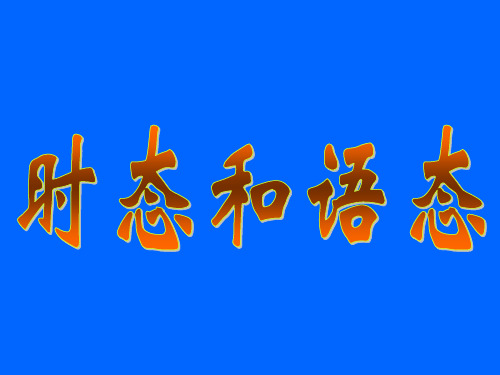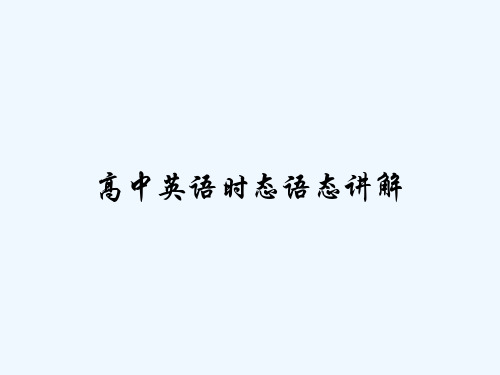高中英语时态综合复习课件
合集下载
高中英语时态全版.ppt

Tom is seeing his friend off at the airport.
.精品课件.
16
过去进行时 表示过去某一时刻或某一段时间内正在进行 的动作。这一特定的过时间可用时间状语表 示
He was watching TV when I came in.
---What were you doing this time yesterday? ---I was writing a letter.
I will study hard to keep up with my classmates.
He won’t do it.
You shall have the book.
.精品课件.
8
2.be going to + 动词原形:含有打算、计划、 准备将做某事的意思,或表示很有可能要发 生的事。
3.若表示已安排或计划好的将来动作或存 在状态,可用一般现在时代替一般将来 时,其谓语动词常为be, come, go, arrive, leave, start等
Where shall we meet tomorrow?
.精品课件.
7
注:shall和will除了上述表示单纯的将来外, 还有其他用法。在第一人称后,will常表示 “决心”、“意愿”或“打算”,在否定
句中用于所有人称,有“不愿”的意思。 shall用于第二人称时,可表示说明者的将 来意愿或允诺。
the window.)
.精品课件.
4
7. 由here, there开头的句子,动词 用一般现在时表示正在发生的动 作。如:
There goes the bell.
Here comes the teacher.
高中英语语法时态和语态课件(共69张PPT)

不能用 be+v-ing, be+v-ing表示将来,主要强调已经 作出的 安排,e.g. i’m pic you up at 6:00,don’t forget. ) ②强调某个意图是事先考虑好的:
--ann is in hospital.
--yes, i know. i’m going to visit her tomorrow.
--oh,really? i didn’t know. i’ll go and visit her. 2〕表示迹象表明要发生某事,则只能用be going to,e.g.
look at the dark clouds.it’s going to rain. 3〕be going to还有以下用法,e.g. ①强调主观想法或意图: i’m going to wash the car if i have time. (注意:此时
②It was then a small fishing village.
2.特别用法:
1〕表客气或委婉的现在:
①I wondered if you were free this evening.
②I thought you might like some flowers.
(注:过去进行时也可表示现在使语气更委婉、客气,eg.① I was wondering if you could give me a lift. ②We were hoping you would stay with us.能这样用的动 词主要限于want, wonder , think, hope, intend等少数 动词。)
②Someone has broken the window.(结果: 窗户仍破 着)
2〕持续性用法:该用法表示一个过去发生的动作在过去 并未在过去完成,而是持续到现在,且可能继续持续下去 或可能到此结束,e.g.
--ann is in hospital.
--yes, i know. i’m going to visit her tomorrow.
--oh,really? i didn’t know. i’ll go and visit her. 2〕表示迹象表明要发生某事,则只能用be going to,e.g.
look at the dark clouds.it’s going to rain. 3〕be going to还有以下用法,e.g. ①强调主观想法或意图: i’m going to wash the car if i have time. (注意:此时
②It was then a small fishing village.
2.特别用法:
1〕表客气或委婉的现在:
①I wondered if you were free this evening.
②I thought you might like some flowers.
(注:过去进行时也可表示现在使语气更委婉、客气,eg.① I was wondering if you could give me a lift. ②We were hoping you would stay with us.能这样用的动 词主要限于want, wonder , think, hope, intend等少数 动词。)
②Someone has broken the window.(结果: 窗户仍破 着)
2〕持续性用法:该用法表示一个过去发生的动作在过去 并未在过去完成,而是持续到现在,且可能继续持续下去 或可能到此结束,e.g.
高中英语英语时态完整版 PPT课件 图文

英语的时态
一、一般现在时
一直以来的习惯动作;目前状态;规律
一般现在时
单三人称:动词 s或es 非单三人称:动词原形
动词第三人称单数的变化规则
1、直接在动词后+s
like- likes
play-plays
2、以s, x, sh, ch, 接尾的动词:+es
wash-washes
3、以辅音+o接尾的动词:+es
go-goes
4、以辅音+y接尾的动词:变y为i+es
fly-flies
一、一般现在时的用法
1) 经常性或习惯性的动作,常与表示频度的时间状 语everyday, often, always, once a week, seldom, usually等连用。
I leave home for school at 7 every morning. He cycles to work every day. 2) 客观真理,客观存在,科学事实。 The earth moves around the sun. Shanghai lies in the east of China. Water boils at 100 centigrade degrees.
一、基本概念:
过去将来时表示从过去的某一时间看将要发生的动作或存在的状态。 它是一个相对的时态,即立足于过去某时,从过去的某一时间看即 将发生的事情就要用这一时态。 1) He said his mother would buy a bike for him 2) My brother told me he wouldn’t believe Jack any more. 3) Would it be all right if he knew his illness?
一、一般现在时
一直以来的习惯动作;目前状态;规律
一般现在时
单三人称:动词 s或es 非单三人称:动词原形
动词第三人称单数的变化规则
1、直接在动词后+s
like- likes
play-plays
2、以s, x, sh, ch, 接尾的动词:+es
wash-washes
3、以辅音+o接尾的动词:+es
go-goes
4、以辅音+y接尾的动词:变y为i+es
fly-flies
一、一般现在时的用法
1) 经常性或习惯性的动作,常与表示频度的时间状 语everyday, often, always, once a week, seldom, usually等连用。
I leave home for school at 7 every morning. He cycles to work every day. 2) 客观真理,客观存在,科学事实。 The earth moves around the sun. Shanghai lies in the east of China. Water boils at 100 centigrade degrees.
一、基本概念:
过去将来时表示从过去的某一时间看将要发生的动作或存在的状态。 它是一个相对的时态,即立足于过去某时,从过去的某一时间看即 将发生的事情就要用这一时态。 1) He said his mother would buy a bike for him 2) My brother told me he wouldn’t believe Jack any more. 3) Would it be all right if he knew his illness?
高中英语语法:动词的时态课件

二、一般过去时
(2)语境中的一般过去时,往往表示“刚才,在过去”之意,暗 示现在“已不再这样”。 Oh,how nice of you! I never thought you were going to bring me a gift.噢,你真是太好了!我没想到你会给我送礼物。 I didn’t notice where I was going.我当时没有注意到正往哪儿走。 Oh, it’s you, Mary. I didn’t know you would come.噢,是你啊,玛 丽,我不知道你会来。 (3)在时间和条件状语从句中,代替过去将来时。 Mary said as soon as she arrived there, she would ring me up.玛丽说 她一到达那里就给我打电话。
read reads读
write writes写
become becomes变成
know knows知道
一、一般现在时
(2)以字母s,x, ch, sh,o结尾的单词在词尾加-es。
watch watches观看
do does做
guess guesses 猜测
finish finishes完成
(3)以“辅音字母+y”结尾的动词,先变y为i,再加-es。
动词的时态综述
英语动词的时态变化共有一般、完成、进 行和完成进行4种形式,每种形式又包括现在、 过去、将来和过去将来4个时间,共组合成16 种时态形式。 高中英语课程标准要求同学们掌握的时态只有 8种:一般现在时、一般过去时、一般将来时、 现在进行时、过去进行时、现在完成时、过去 完成时、过去将来时。
stir
stirred搅拌
planΒιβλιοθήκη planned计划二、一般过去时
高考英语一轮复习英语语法专题复习:时态和语态课件

【高中语法】 时态与语态
语法知识
英语语法框架
音素★
语音 词法
音节 五种语音现象★ 九大词类 动词★ 词汇搭配 八种句子成分
时态 两大语态 三类非谓语动词
四类句子
句法
五种简单句
并列句
名词性从句
复合句★ 定语从句
特殊句式★ 状语从句
主谓一致
CONTENTS
时态与语态
• 一般时态 • 进行时态 • 完成时态 • 完成进行时态 • 主动语态 • 被动语态
now
future
将来完成进行时 will/shall have been doing
• 动作在某种情况下一直持续到将来某个时间仍未结束。 By the end of this year he will have been acting for thirty years.
将来进行时态
用法: ① 将来某个时间正在进行的动作,或会延续到将来的动作
What will you be ① 常和时间状语then, at that time/moment等连用。
语态是通过动词的变化表现出来的。
doing
at
this
time
next
Monday.
表示将来某个时间要发生的动作或存在的状态。
B. takes
C. is taking
D. has taken
B off at
【解析】考查时态。飞机、火车等按时刻表运行,表达时用一般现 在时表示将来。
一般过去时
(1) 表示过去某个时间发生的动作。 He proposed to Sarah on their annivesary.
(2) 过去某段时间的状态。 I loved him.
语法知识
英语语法框架
音素★
语音 词法
音节 五种语音现象★ 九大词类 动词★ 词汇搭配 八种句子成分
时态 两大语态 三类非谓语动词
四类句子
句法
五种简单句
并列句
名词性从句
复合句★ 定语从句
特殊句式★ 状语从句
主谓一致
CONTENTS
时态与语态
• 一般时态 • 进行时态 • 完成时态 • 完成进行时态 • 主动语态 • 被动语态
now
future
将来完成进行时 will/shall have been doing
• 动作在某种情况下一直持续到将来某个时间仍未结束。 By the end of this year he will have been acting for thirty years.
将来进行时态
用法: ① 将来某个时间正在进行的动作,或会延续到将来的动作
What will you be ① 常和时间状语then, at that time/moment等连用。
语态是通过动词的变化表现出来的。
doing
at
this
time
next
Monday.
表示将来某个时间要发生的动作或存在的状态。
B. takes
C. is taking
D. has taken
B off at
【解析】考查时态。飞机、火车等按时刻表运行,表达时用一般现 在时表示将来。
一般过去时
(1) 表示过去某个时间发生的动作。 He proposed to Sarah on their annivesary.
(2) 过去某段时间的状态。 I loved him.
高三一轮复习高考时态复习课件【公开课】课件(共26张)

完成时
过去完成时: had done
将来完成时: will have done
注意:时态语态不分家
找谓语动词时态:
一、找时间状语 二、看已有谓语动词
三、理解语境
1、一般现在时(1)经常性、习惯性动 作;(2)客观事实或状态
常用时间状语:always, every time, now and then, often, seldom, sometimes, usually, etc.
常用时间状语:yesterday, last week, two days ago, the other day, in 1998, 时间段+later, 将来时
1. Tom will buy (buy) a new big house next week. leaves (leave) at 2. Hurry up. The train 8:00 clock. 3. I told him that I will see him the next day. would
1. I don’t actually work here. I am helping (help) out until the new secretary comes. 2. Jackwas working(work) in the lab when the power cut occurred.
过去将来时常用时间状语:the next day/morning, the next/following week/month/year, etc
4、进行时态:be + doing,表示当时或 一段时间内正在或持续发生的动作
现在进行时常用时间状语:all the time, now, at 4 o’clock, at this moment, at present, etc.
高中英语时态之复习课件.ppt

C. played D. play
Months ago we sailed ten thousand miles across this open sea, which ____the Pacific, and we met no storms.(05Liaoning)
A. was called
B. is called
C. had been called D. has been called
181h,
4)一般现在时的特殊用法
i:一般现在时代替过去时表过去
在宾从中,尽管主句用过去时,但从句所述内容为客 观真理或经常性的动作,其谓动仍用一般现在时
The teacher told her pupils that the sun rises in the east.
Every few years, the coal workers X-rayed to ensure their health.
their lungs
A. are having B. have C. have had D. had had
181h,
ii:一般现在时代替进行时பைடு நூலகம்
在某些习惯性表达法中,表现正在发生 的动作或存在的状态 Here comes the bus!
181h,
3) be about to do:表立刻发生的动作, “立即”,“马上”不久就要…
He is about to leave for Qingdao .
be about to…when…就要做 。。这时
I was about to go out when the telephone
rang.
181h,
☆be to do和be going to 的用法之比较: be to do: 表客观安排或受人指示而做某 事。 be going to do:则表示主观的打算或计 划。
高考英语时态总结-全PPT课件

常与频率副词连用 7大频率副词: always,usually,often,sometimes,once,seldo m,rarely,hardly ever,never
完 成
完成 进行
现在完成时 过去完成时
.
21
时间 状态 基本结构
一 般
现在
过去
将来
过去将来
一般现在时
一般过去时
一般将来时 过去将来时
进 行
现在进行时 过去进行时
完 成
完成 进行
现在完成 时 过去完成时
.
22
最常用的几种时态与时间状语的搭配
一般现在 every …, sometimes, at …, on Sunday
过去
现在
过去将来
.
6
时态表示的4种状态
一般-----经常性的动作、状态;一次性的动作。 经常性的动作: I sing English songs every day. 经常性的状态: We love China. 一次性的动作: They climbed up the mountain.
.
7
时态表示的4种状态
.
25
I saw Hero last year. (看《英雄》的时间是去年,与现在无关) I have seen Hero before. (强调现在知道这部电影的内容。以前看过,但 “以前”是表示一个与现在有联系的过去时间, 而 不是一个确定的与现在无关的过去时间) 2.一般过去时和过去完成时的用法区别 (1)一般过去时是对现在说话时刻而言的,过去完 成时则是对过去某一时刻而言。两种时态建立的时间 参照点不同,对过去完成时来说,这个时间参照点十 分重要,它是过去完成概念. 赖以建立的基础,也是和 26
完 成
完成 进行
现在完成时 过去完成时
.
21
时间 状态 基本结构
一 般
现在
过去
将来
过去将来
一般现在时
一般过去时
一般将来时 过去将来时
进 行
现在进行时 过去进行时
完 成
完成 进行
现在完成 时 过去完成时
.
22
最常用的几种时态与时间状语的搭配
一般现在 every …, sometimes, at …, on Sunday
过去
现在
过去将来
.
6
时态表示的4种状态
一般-----经常性的动作、状态;一次性的动作。 经常性的动作: I sing English songs every day. 经常性的状态: We love China. 一次性的动作: They climbed up the mountain.
.
7
时态表示的4种状态
.
25
I saw Hero last year. (看《英雄》的时间是去年,与现在无关) I have seen Hero before. (强调现在知道这部电影的内容。以前看过,但 “以前”是表示一个与现在有联系的过去时间, 而 不是一个确定的与现在无关的过去时间) 2.一般过去时和过去完成时的用法区别 (1)一般过去时是对现在说话时刻而言的,过去完 成时则是对过去某一时刻而言。两种时态建立的时间 参照点不同,对过去完成时来说,这个时间参照点十 分重要,它是过去完成概念. 赖以建立的基础,也是和 26
高考英语时态和语态复习PPT课件

1. Listen! Someone _i_s_k_n__o_c_k_i_n_g_ (knock) at the
door.
2. He fell asleep while he w__a_s_r_e_a__d_in__g (read) a
book.
【典例剖析】用所给词的适当形式填空 (2015·北京高考)I______(write)to tell you my exciting plan for the summer holiday.
4
现在完成时表示过去发生的动作对现在产生的 结果和影响或动作从过去开始,一直持续到现在, 可能还会持续。
1.表示动作已经发生或完成(已结束),此时 该动作通常为短暂意义的动词,如open, go, come, die, arrive, leave, lose, fall等。短暂性动作不能与含 有一段时间的完成时连用,因为它们表示的动作不 可能持续。但可与just, already,yet, never, always, often, before等连用或与延续性动词替换;
room.
Two years ago, her parents __m__o_v__e_d_ (move) to China. Jenny _d__id__n_’_t _h_a_v_e_ (not have) any friends, so she ___f_e_l_t_ (feel) lonely. But now, she __h_a_s___ (have) many Chinese friends and _s_tu__d_i_es_ (study) with them
解题关键: 此句是书信的开头语, 强调现在正在写信, 故 用现在进行时。 答案判定: am writing
door.
2. He fell asleep while he w__a_s_r_e_a__d_in__g (read) a
book.
【典例剖析】用所给词的适当形式填空 (2015·北京高考)I______(write)to tell you my exciting plan for the summer holiday.
4
现在完成时表示过去发生的动作对现在产生的 结果和影响或动作从过去开始,一直持续到现在, 可能还会持续。
1.表示动作已经发生或完成(已结束),此时 该动作通常为短暂意义的动词,如open, go, come, die, arrive, leave, lose, fall等。短暂性动作不能与含 有一段时间的完成时连用,因为它们表示的动作不 可能持续。但可与just, already,yet, never, always, often, before等连用或与延续性动词替换;
room.
Two years ago, her parents __m__o_v__e_d_ (move) to China. Jenny _d__id__n_’_t _h_a_v_e_ (not have) any friends, so she ___f_e_l_t_ (feel) lonely. But now, she __h_a_s___ (have) many Chinese friends and _s_tu__d_i_es_ (study) with them
解题关键: 此句是书信的开头语, 强调现在正在写信, 故 用现在进行时。 答案判定: am writing
高中英语时态语态讲解 PPT

2.He wrote many plays when he was at college、
3、 ---Nancy is not ing tonight、
进行体: 它具有暂时性、持续性、未完成性得特点。 现在进行时: 表示此刻或现阶段进行得动作。 过去进行时: 用来表示过去特定得某一时刻正在发生或过 去某一段时间内持续发生得事情。
closes、
3、 进行时将来:表示计划、安排要做得事。如: •I’ve won a holiday for two days to Florida、 I am taking my mum、 •— What were you doing when Tony phoned
you ?
— I had just finished my work and was starting to take a shower、
得不定式被动式有特殊得用法。
• The news is to be found in the evening paper 、
• He is nowhere to be seen、 • You are to be congratulated、 应当向您表示祝
贺。
5、 will/shall will得特殊用法:可以用于表示事先未考虑过, 即说话时临时想到得。 Eg、 ---you’ve left the light on、
1、 All morning as she waited for the
medical report from the doctor, her
nervousness 、
A、has grown
B、is growingC、grwD、had grown
2、 My mind wasn’t on what he was
3、 ---Nancy is not ing tonight、
进行体: 它具有暂时性、持续性、未完成性得特点。 现在进行时: 表示此刻或现阶段进行得动作。 过去进行时: 用来表示过去特定得某一时刻正在发生或过 去某一段时间内持续发生得事情。
closes、
3、 进行时将来:表示计划、安排要做得事。如: •I’ve won a holiday for two days to Florida、 I am taking my mum、 •— What were you doing when Tony phoned
you ?
— I had just finished my work and was starting to take a shower、
得不定式被动式有特殊得用法。
• The news is to be found in the evening paper 、
• He is nowhere to be seen、 • You are to be congratulated、 应当向您表示祝
贺。
5、 will/shall will得特殊用法:可以用于表示事先未考虑过, 即说话时临时想到得。 Eg、 ---you’ve left the light on、
1、 All morning as she waited for the
medical report from the doctor, her
nervousness 、
A、has grown
B、is growingC、grwD、had grown
2、 My mind wasn’t on what he was
高一英语时态讲解ppt课件.ppt

tomorrow.
(否定句)
Will I/ you/ she/ we/ they watch TV tomorrow?
(一般疑问句)
肯定回答:Yes, I/ you/ she/ we/ they will. 否定回答:No, I/ you/ she/ we/ they will not(won’t).
行 时
肯定:Yes,he/she is. 否定结:构N:o, he/she isn’t.
Sb. +is /are /am + v-ing.(肯定句)
SWb.e+/Tishne’ty//aYroenu’ta/raemwnaottc+hvin-igngT.(V 否no定w句.()肯定句)
IsW/Aer/eT+hSeby./+Yov-uinagr?e(n一’t w般a疑tc问hi句ng)TV now.(否定句) 肯A定re回w答e/t:heYeys/y, osbu. +wisa/tacrhe/inamg .TV now(?一般疑问句)
认识到了贫困户贫困的根本原因,才 能开始 对症下 药,然 后药到 病除。 近年来 国家对 扶贫工 作高度 重视, 已经展 开了“ 精准扶 贫”项 目
一般过去时
I watched TV last night
I watch TV everyday. 一般现在时
I am watching TV now. 现在进行时
一 般
肯定回答: Yes , I/we do. 否定回答:No, I/we don’t现.
He He
/ /
She She
wdoaetcshne’tswTaVtcehveTrVydeavye.r(yd肯ay定. 句()否定句)在时
高考英语时态专题复习(共58张PPT)

词 构成句型: …be about to do …when…. I was about to leave when it rained. 5. mean/plan/aim/intend to do 表示打算做某事
注意:
(等1)时一刻般表现中在安时排表好示的将。来,es tomorrow.(尽管有tomorrow, 但没有 will ,be going to )
1 一般现在时的用法
2) 客观真理,客观存在,科学事实或表示格言或警句。 ①Knowledge begins with practice. ② She said that the sea water is salty. ③In some parts of the world, such as in England ,
时态和语态的主要考点
1、考查在语境中判断动词时态的运用能力。常考 的时态为:一般现在、一般过去、一般将来、现在 进 行、过去进行、现在完成、过去完成、现在完成 进行、过去将来等。
2、时间、条件、让步等状语从句中动词的时态; 主从句时态呼应问题。
3、几种时态的替代问题.
最常用的几种时态与时间状语的搭配
① be going to 有很强的计划性,打算干什么,而will 表示谈话时临时决定的意图,具有临时性和偶然 性。 ----The telephone is ringing. ----I _____ answer it.
A. will B. am going to C. am to D. am about to ---Alice, why didn’t you come yesterday? ---I _____, but I had an unexpected visitor. A. had B. would C. was going to D. did
注意:
(等1)时一刻般表现中在安时排表好示的将。来,es tomorrow.(尽管有tomorrow, 但没有 will ,be going to )
1 一般现在时的用法
2) 客观真理,客观存在,科学事实或表示格言或警句。 ①Knowledge begins with practice. ② She said that the sea water is salty. ③In some parts of the world, such as in England ,
时态和语态的主要考点
1、考查在语境中判断动词时态的运用能力。常考 的时态为:一般现在、一般过去、一般将来、现在 进 行、过去进行、现在完成、过去完成、现在完成 进行、过去将来等。
2、时间、条件、让步等状语从句中动词的时态; 主从句时态呼应问题。
3、几种时态的替代问题.
最常用的几种时态与时间状语的搭配
① be going to 有很强的计划性,打算干什么,而will 表示谈话时临时决定的意图,具有临时性和偶然 性。 ----The telephone is ringing. ----I _____ answer it.
A. will B. am going to C. am to D. am about to ---Alice, why didn’t you come yesterday? ---I _____, but I had an unexpected visitor. A. had B. would C. was going to D. did
高中时态复习优质课PPT课件

have /has + Vp.p will have + Vp.p am /is / are + Ving
was20/2w1 ere + Ving
13
1.一般现在时态( The Simple Present Tense)
概念:表示经常发生的或习惯性的动作或
状态。
构成形式 : do / does(三单)
tomorrow.
If it ___r_a_in__s_ (rain) tomorrow, we’ll not go for a
picnic.
2021
18
2. 一般过去时态(The Simple Past Tense)
概念: 表示过去某个时间发生的动
作或存在的状态
构成形式 : V+ed
常用时间状语 :
4. 1)At college, Barack Obama didn’t know that he _______(become) the first black president of America.
2) he promised that he __________(join) us,
but he hasn’t turne2d021up at the party.
①If it is fine tomorrow ,we will go to the countryside.
2021
17
如果明天不下雨,我们将去野营。
1)If itd_o_e_s_n_’t_r_a_in(rain) tomorrow, we’ll go on a picnic.
2)We _w_i_ll_b_e_g_in__ ( begin) our class as soon as the teacher _c_o_m_e_s_(come) 3)We don’t know if it __w__il_l _ra__in___(rain)
高三英语时态语态复习课.ppt

过去完成时态由时间状语来判定 与过去完成时连用的时间状语有: ( 1 ) by + 过去的时间点。如: I had finished reading the novel by nine o'clock last night. ( 2 ) by the end of + 过去的时间点。如: We had learned over two thousand English words by the end of last term. ( 3 ) before + 过去的时间点。如:They had planted six hundred trees before last Wednesday
2.At the end of the meeting,the headmaster ___g_a_ve____(give)us a talk.
3.The boys are tired. They __h_a_v_e_ju_s_t_p_l_a_y_e_d_ (just play) a ball game.
He has lived in Beijing for four years. 他在北京
住了四年了。(现在仍住那儿)
He lived in Beijing for four years. 他曾在北京住
了四年。(现在不住那儿了)
Let’s practice
1.Daniel _h_a_s_l_iv_e_d___ (live) in Beijing since he came to China.
在过去某个时间里所发生的动作或存在的状态
一般将来时 过去将来时 现在进行时 过去进行时
will/shall动词原 形 would 动词原形
am/is/are 现在分 词doing was/were doing
- 1、下载文档前请自行甄别文档内容的完整性,平台不提供额外的编辑、内容补充、找答案等附加服务。
- 2、"仅部分预览"的文档,不可在线预览部分如存在完整性等问题,可反馈申请退款(可完整预览的文档不适用该条件!)。
- 3、如文档侵犯您的权益,请联系客服反馈,我们会尽快为您处理(人工客服工作时间:9:00-18:30)。
3. —I’m sure Andrew will win the first prize in the final. has been preparing —I think so. He _________________(prepare) for it for months. met 4. Judy is going to marry the sailor she _______(meet) in Rome last year.
will have finished 2. I _____________________(finish) the work before he returns.
3. By 8 o’clock tomorrow evening, I ________________(finish) will have finished my performance and _________________(meet) the reporters will be meeting at the meeting room. 4. I’m sure the harder you work, the better progress you will make __________________(make). would not make 5. He promised he ___________(not make) the same mistake again. will be 6. Hurry up , or you ________________(be) late for class.
have had such an experience.
3. –I met John the other day. hadn’t seen -You ______________(not see) each other for ages. had meant 4. They _____________(mean) to see me off at the airport, but they got there late.
5. Don’t take his remarks seriously. He was so sad that
knew I don’t think he really ________(know) what he was saying. 6. –Can you give me some advice on what I said just now? was wandering --Sorry, my mind ________________一般时 现在时 do/does 过去时 将来时 did will do 进行时 am/is /are doing was/were doing will be doing 完成时 have/has done had done will have done 完成进行时 have/has been doing had been doing
-I ________________(play) football with my classmates and how I have been playing
want to have a drink.
过去时:(Past Tense)
1、一般过去时: did / was, were
与过去的时间状语连用:the other day; last term; three decades ago 2、过去进行时:was /were doing
2. The planetakes _______(take) off at 8 tomorrow morning. am not invited 3. If I __________________(not invite), I won’t go. is complaining 4. She _____ always ____________(complain) about her job. 5. It is the first time I have visited _________(visit) the Bird’s Nest. has been 6. It _________(be) 5 years since they separated. has seen 7. The past few years _________(see) the rapid development in China. 8. –Why are you so hot?
It’s the first time+完成时、since+过去的点时间等连用
4、现在完成进行时:have/has been doing 刚刚过去的动作对现在的影响或继续持续下去
Practice1:
wears 1. This kind of glasses ________(wear) comfortably.
5. He ___________(play) football regularly for many years when played
he was young. 6. –What’s that noise? is being tested –Oh, I forgot to tell you. The new machine _______________(test).
将来时:(Future Tense)
1、一般将来时:will/shall do 2、将来进行时:will be doing
3、将来完成时: will have done
4、过去将来时: would do
Practice3: will send 1. We ______________( send) for a doctor if you are not better this afternoon.
过去正在进行的动作,可与at that time连用
3、过去完成时:had done 表过去的动作之前或过去时间之前所发生的事
( by/before +过去的点时间;
before/when/by the time +过去的时间状语从句)
Practice2: had learned 1. By the end of last term, we ______________(learn) 12 units. 2. I __________(work) in Shanghai for 5 years. I’m proud to worked
动词的时态
• 现在时(一般现在时、现在进行时、 现在完成时、现在完成进行时) • 过去时(一般过去时、过去进行时、 过去完成时) • 将来时(一般将来时、将来进行时、 将来完成时、过去将来时)
现在时:(Present Tense)
1、一般现在时:do/does
表客观真理、时刻表的安排、现在的状况、
Practice4:
will be made 1. No decision _____________(make) about any future appointment until all the candidates have been interviewed. had left 2. The moment I got home, I found I ___________ (leave) my jacket on the playground.
时间状语和条件状语从句中用一般现在时表示将来 2、现在进行时:am/is/are doing
现在正进行的动作、与always连用表强烈的语气、表计划安排
3、现在完成时:have/has done 常与recently/lately/ so far/ up to now/in the past three years/
will have finished 2. I _____________________(finish) the work before he returns.
3. By 8 o’clock tomorrow evening, I ________________(finish) will have finished my performance and _________________(meet) the reporters will be meeting at the meeting room. 4. I’m sure the harder you work, the better progress you will make __________________(make). would not make 5. He promised he ___________(not make) the same mistake again. will be 6. Hurry up , or you ________________(be) late for class.
have had such an experience.
3. –I met John the other day. hadn’t seen -You ______________(not see) each other for ages. had meant 4. They _____________(mean) to see me off at the airport, but they got there late.
5. Don’t take his remarks seriously. He was so sad that
knew I don’t think he really ________(know) what he was saying. 6. –Can you give me some advice on what I said just now? was wandering --Sorry, my mind ________________一般时 现在时 do/does 过去时 将来时 did will do 进行时 am/is /are doing was/were doing will be doing 完成时 have/has done had done will have done 完成进行时 have/has been doing had been doing
-I ________________(play) football with my classmates and how I have been playing
want to have a drink.
过去时:(Past Tense)
1、一般过去时: did / was, were
与过去的时间状语连用:the other day; last term; three decades ago 2、过去进行时:was /were doing
2. The planetakes _______(take) off at 8 tomorrow morning. am not invited 3. If I __________________(not invite), I won’t go. is complaining 4. She _____ always ____________(complain) about her job. 5. It is the first time I have visited _________(visit) the Bird’s Nest. has been 6. It _________(be) 5 years since they separated. has seen 7. The past few years _________(see) the rapid development in China. 8. –Why are you so hot?
It’s the first time+完成时、since+过去的点时间等连用
4、现在完成进行时:have/has been doing 刚刚过去的动作对现在的影响或继续持续下去
Practice1:
wears 1. This kind of glasses ________(wear) comfortably.
5. He ___________(play) football regularly for many years when played
he was young. 6. –What’s that noise? is being tested –Oh, I forgot to tell you. The new machine _______________(test).
将来时:(Future Tense)
1、一般将来时:will/shall do 2、将来进行时:will be doing
3、将来完成时: will have done
4、过去将来时: would do
Practice3: will send 1. We ______________( send) for a doctor if you are not better this afternoon.
过去正在进行的动作,可与at that time连用
3、过去完成时:had done 表过去的动作之前或过去时间之前所发生的事
( by/before +过去的点时间;
before/when/by the time +过去的时间状语从句)
Practice2: had learned 1. By the end of last term, we ______________(learn) 12 units. 2. I __________(work) in Shanghai for 5 years. I’m proud to worked
动词的时态
• 现在时(一般现在时、现在进行时、 现在完成时、现在完成进行时) • 过去时(一般过去时、过去进行时、 过去完成时) • 将来时(一般将来时、将来进行时、 将来完成时、过去将来时)
现在时:(Present Tense)
1、一般现在时:do/does
表客观真理、时刻表的安排、现在的状况、
Practice4:
will be made 1. No decision _____________(make) about any future appointment until all the candidates have been interviewed. had left 2. The moment I got home, I found I ___________ (leave) my jacket on the playground.
时间状语和条件状语从句中用一般现在时表示将来 2、现在进行时:am/is/are doing
现在正进行的动作、与always连用表强烈的语气、表计划安排
3、现在完成时:have/has done 常与recently/lately/ so far/ up to now/in the past three years/
